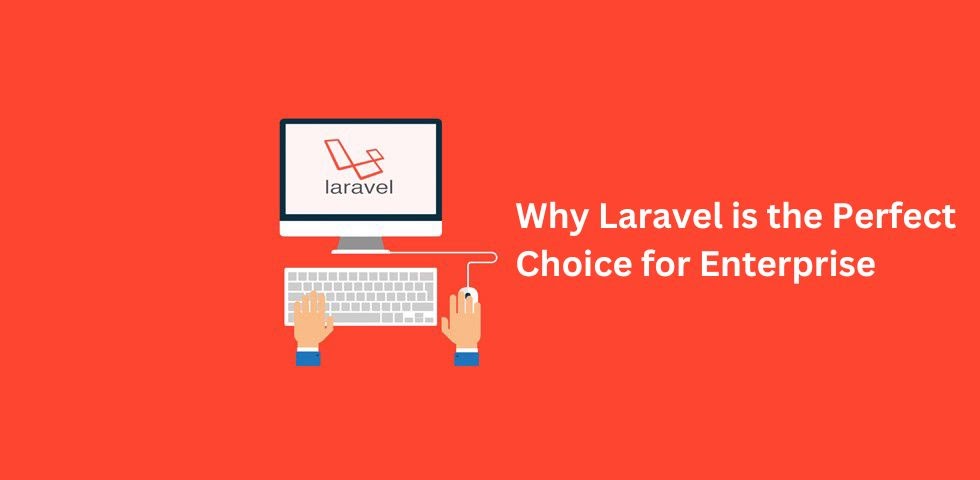Laravel has become a popular PHP framework among developers in recent years due to its elegant syntax, simple code structure, and built-in tools and features. But did you know that Laravel can also provide significant benefits for enterprises looking to build scalable, secure, and high-quality applications?
In this blog post, we’ll explore the various benefits of Laravel for enterprises and why it’s worth considering for your next application development project.
So whether you’re a seasoned Laravel developer or new to the framework, read on to learn why Laravel is a valuable tool for enterprises looking to build high-quality applications with speed and security – and maybe even have a little fun along the way.
Ease of Development
When it comes to application development, time is money. That’s why one of the biggest benefits of Laravel for enterprises is its ease of development. Laravel’s elegant syntax and simple code structure make it easy for developers to write clean, maintainable code, without sacrificing functionality or performance.
One of the key tools that makes Laravel development so easy is Artisan, Laravel’s built-in command-line interface (CLI). Artisan allows developers to perform a wide range of tasks, from generating boilerplate code to running database migrations, with just a few simple commands. This can save developers hours of time that would otherwise be spent on tedious, manual tasks.
Another key feature of Laravel is Eloquent, it’s Object-Relational Mapping (ORM) system. Eloquent provides a simple and intuitive way to work with databases, allowing developers to write queries using PHP code rather than SQL. This can make database interactions much faster and more efficient and can help prevent errors caused by typos or other mistakes in SQL queries.
Finally, Laravel’s templating engine, Blade, makes it easy to create dynamic, responsive web pages without having to write a lot of HTML or CSS code. The blade allows developers to use a simple syntax to define page layouts, insert variables and other dynamic content, and even create reusable components that can be used across multiple pages.
All of these tools and features make Laravel development faster, more efficient, and more enjoyable for developers. And because Laravel is open-source and has a large and active community, developers can easily find help, support, and additional resources when they need it.
But it’s not just about making developers’ lives easier. Laravel’s ease of development can also have significant business benefits for enterprises. By streamlining the development process, enterprises can build applications faster and more efficiently, which can help them stay competitive in today’s fast-paced business environment.
And because Laravel is so easy to work with, enterprises can also save money on development costs, allowing them to invest more resources in other areas of their business.
Scalability
Scalability is a critical concern for enterprises, especially those with rapidly growing user bases or large volumes of data. Fortunately, Laravel is designed with scalability in mind, making it an excellent choice for enterprises looking to build applications that can grow and evolve over time.
One of the key features that make Laravel so scalable is its modular architecture. Laravel applications are built from a series of discrete components, each of which can be easily added, removed, or replaced as needed. This makes it easy to break an application down into smaller, more manageable pieces, which can help with maintenance, testing, and debugging.
The most popular PHP framework Laravel also has strong dependency management, which means that it’s easy to keep track of the relationships between different components and ensure that changes to one component don’t break other parts of the application. This can be especially important as applications grow and become more complex.
Another key feature of Laravel that makes it scalable is its support for caching. Laravel has built-in support for several popular caching systems, including Redis and Memcached, which can help speed up application performance by reducing the number of times that data needs to be fetched from the database.
Finally, Laravel’s support for horizontal scaling is another significant advantage for enterprises. Horizontal scaling involves adding more servers to handle increased traffic, rather than simply adding more resources to a single server. Laravel makes it easy to deploy applications across multiple servers, allowing enterprises to scale their applications to handle millions of users without sacrificing performance.
Security
In today’s digital landscape, security is a top concern for enterprises of all sizes. Fortunately, Laravel is a framework that takes security seriously, providing enterprises with a robust set of tools and features to help keep their applications secure.
One of the key security features of Laravel is its built-in support for authentication and authorization. Laravel’s authentication system is designed to be easy to use, yet highly customizable, allowing developers to implement secure login and user management functionality in their applications with ease.
Additionally, Laravel’s authorization system provides fine-grained control over access to resources, ensuring that only authorized users can perform sensitive actions.
Laravel also includes a range of security features to help protect against common web application attacks, such as cross-site scripting (XSS) and SQL injection. For example, Laravel’s Query Builder and Eloquent ORM both use parameter binding by default, which helps prevent SQL injection attacks.
Laravel also includes built-in support for cross-site request forgery (CSRF) protection, which helps prevent unauthorized users from submitting forms or making requests on behalf of authenticated users.
Integration with Third-Party Services
Integration with third-party services is a critical requirement for many enterprise applications, as it allows businesses to leverage the capabilities of external services and systems to improve their own operations.
Fortunately, Laravel is designed with integration in mind, providing a range of tools and features to help enterprises seamlessly connect their applications with third-party services.
One of the key features of Laravel that makes integration with third-party services easy is its support for RESTful APIs. RESTful APIs are a common way for applications to communicate with each other over the web, and Laravel provides a robust set of tools for working with RESTful APIs, including its built-in HTTP client, Guzzle.
Laravel also includes a range of integrations with popular third-party services, such as Mailgun, AWS, and Stripe. These integrations provide a streamlined way for developers to connect their applications with these services, without having to write complex integration code from scratch.
Additionally, Laravel’s modular architecture makes it easy to add custom integrations with third-party services. Developers can create their own packages or libraries to handle specific integration scenarios, which can be easily shared and reused across different applications.
Community Support
One of the most significant benefits of using Laravel for enterprise development is the incredible level of community support that surrounds the framework. Laravel has a vast and active community of developers, who are constantly sharing knowledge, collaborating on projects, and providing support to fellow developers.
Laravel’s community support is driven by its open-source nature, which has fostered a culture of collaboration and knowledge sharing among developers. The framework is developed on GitHub, which allows developers to easily contribute code, report issues, and collaborate with others on the project.
One of the key benefits of Laravel’s community support is the availability of a wide range of packages and libraries. These packages and libraries can be easily installed using Laravel’s built-in package manager, Composer, and can provide solutions to common problems, such as handling payments, integrating with third-party services, and managing complex workflows. These packages and libraries are often created and maintained by community members, who share them freely with the wider Laravel community.
Another significant benefit of Laravel’s community support is the availability of high-quality documentation and tutorials. The Laravel documentation is widely considered to be some of the best in the industry, providing clear, concise guidance on every aspect of the framework, from basic installation to advanced development techniques.
Additionally, there are many third-party tutorials, blog posts, and video courses available online, which provide in-depth coverage of specific topics and use cases.
Laravel’s community support extends beyond just the framework itself, with active communities on social media, forums, and chat platforms such as Discord and Slack. These communities provide a valuable source of knowledge, as developers can ask questions, get help with issues, and connect with other developers working with Laravel.
Finally, Laravel’s community support ensures that the framework is constantly improving and evolving, with new features and capabilities being added on a regular basis. This means that enterprises can be confident that their applications will remain up-to-date and able to take advantage of the latest technologies and best practices.
Conclusion
Laravel offers a comprehensive set of features that make it an ideal choice for enterprise development. Its ease of development, scalability, security, integration with third-party services, and active community support make it a powerful and reliable tool for building modern and robust enterprise applications.
If you’re looking to develop enterprise-grade applications that are secure, scalable, and feature-rich, A Laravel Development team can provide you with the expertise and experience needed to successfully leverage Laravel’s capabilities.












Leave a Reply